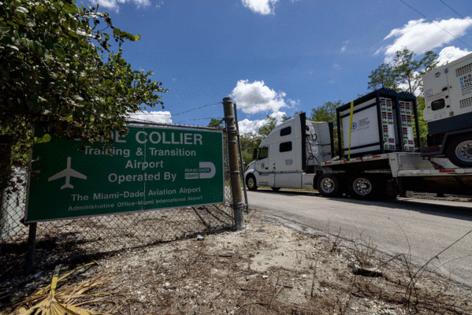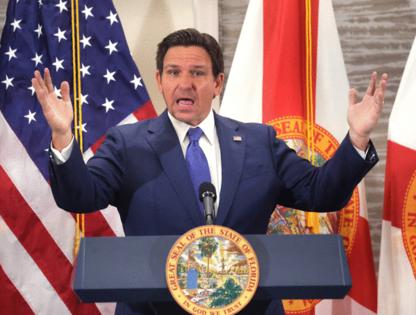How DeSantis leaned on emergency powers to build 'Alligator Alcatraz' in days
Published in News & Features
TALLAHASSEE, Fla. — Nearly three years ago, when Hurricane Ian destroyed a bridge in southwest Florida and left residents on a barrier island with scant access to drinking water and food, Gov. Ron DeSantis leveraged his emergency authority to scramble contractors to reconstruct the bridge. It took less than three days.
Now, the Republican governor is wielding those same powers for something different: building an immigration detention center deep in the Everglades in a week.
Relying on an emergency order issued in January 2023 in response to a flood of Cuban and Haitian migrants arriving by boat in the Florida Keys, DeSantis is seizing county land, mobilizing a team of private companies to build a facility big enough to hold 3,000 detained immigrants and deploying Florida National Guard troops to secure the site. The rush of migrant arrivals ended long ago, but the order, which cites then-President Joe Biden’s “inadequate” response to immigration, has been repeatedly extended.
“This is not our first rodeo,” DeSantis told Fox News on Friday while touring an airfield owned by Miami-Dade County that has quickly been turned into a small grid of heavy-duty tents and trailers.
“The detention of illegal aliens is a little bit different,” the governor acknowledged. “But logistics, we know how to do that.”
The speed by which the state is building the detention camp — nicknamed Alligator Alcatraz in a nod to the gator-filled wetlands surrounding the site – has unnerved environmentalists as well as local and state elected leaders, some of whom are questioning whether the governor is overstepping his authority.
“What is the emergency in the state of Florida that we need to build this facility under this time frame?” Sen. Lori Berman, a Boca Raton Democrat, said on Friday. “We just really can’t understand.”
Technically, the governor is following the letter of the law when it comes to exerting his emergency powers, she said, but the question is whether there is an actual emergency.
“Florida is building a prison camp in the Everglades under the false cover of an emergency,” said Sen. Shevrin Jones, a West Park Democrat.
‘Turbo-speed’
The idea of Alligator Alcatraz first became known to the public on June 18 — less than two weeks before the detention center’s projected opening date. On that day, Florida Attorney General James Uthmeier, a DeSantis appointee, appeared on Fox News to talk about plans for the new facility — complete with a helicopter tour on the site.
The news segment piqued the interest of Ra Schooley, a former flight instructor and pilot familiar with the airstrip. Schooley, a Miami resident, dashed off a quick email to environmental leaders — including Eve Samples from Friends of the Everglades.
“Another thing to keep an eye on…” he noted, sharing a link to the clip.
Two days later, Schooley saw an unusual notice from the Federal Aviation Administration to airmen: the tiny airport was set to close for three days, starting that evening. In close to three decades, Schooley had never seen the strip shut down, so he sounded the alarm to other environmentalists.
“No one knew about it,” he said. “I thought they’d have to go through the community council or something.”
But unlike a typical state construction project, which can be held up in lengthy procurement fights, the state has been able to move at warp speed because of DeSantis’ emergency authorization.
On the morning of June 21, Schooley flew over the area for the last time. The FAA that day sent a notice: no landings for the next 99 days. That same day, Uthmeier was in Washington, D.C., meeting with Department of Homeland Security officials, setting in motion a massive undertaking to build the facility.
At the time, activists were organizing a protest at the property for Sunday, the same day that a core group of private contractors was planning to hold a meeting on site. By Monday, the federal government had approved the plans to build the project, and soon after trucks were bringing in portable restrooms, tents and industrial generators into the area — laying the groundwork for days of around-the-clock construction.
On that same day that construction started, Collier County officials were learning of the plan for the first time, according to emails obtained by the Miami Herald. Records show Collier officials were unclear on key details, including whether they were supposed to continue responding to emergency calls to the address.
“We have our own onsite ambulance transport, and we are compliant with Florida and national model standards,” wrote Kevin Guthrie, head of Florida’s Department of Emergency Management, the agency leading the operation. “It will undergo a federal inspection before opening.”
Miami-Dade County Mayor Daniella Levine Cava also received notice from Guthrie that day. He told her the property, which is owned by the county, was now under the control of the state and that it would remain so until “the duration of the state of emergency,” according to records obtained by the Herald.
Guthrie, who is also empowered to wield the state’s emergency powers, said the state had begun construction on the site, “as I now deem it necessary to meet the Division’s current operational demands in coping with the emergency.”
“Time is of the essence,” he told Levine Cava. “We must act swiftly to ensure readiness and continuity in our statewide operations to assist the federal government with immigration enforcement.”
On Tuesday, officials in Collier, which along with Miami-Dade has oversight of the land, still had big questions left unanswered: “What are the expectations of air medical trauma transport resources? Hurricane, severe weather - evacuation planning. Please forward your refuge plan for severe weather,” Dan Summers, Collier’s director of emergency services, wrote in an email to state officials.
In the event of a hurricane, Division of Emergency Management officials told the Herald that detainees and staff would be evacuated from the site. The agency added that it is developing a disaster plan.
Setting precedent in Texas
DeSantis’ actions aren’t unprecedented.
Early last year, Texas Gov. Greg Abbott used his emergency powers to seize control of a local park in the border city of Eagle Pass, according to reporting from the Texas Tribune.
The park sits off the Rio Grande, which divides Mexico and the United States. According to the city’s mayor, Abbott issued an emergency declaration to take control of the park for use as a staging area. The city wanted to fight the takeover, but felt it wasn’t in their best interest financially.
Once seized by the state, troopers from Texas and Florida patrolled the premises and didn’t let anyone in without permission, including U.S. Border Patrol agents, according to the Biden administration.
Texas’ takeover of the park came years into an ongoing disaster proclamation over the border that Abbott first issued in 2021. He renewed the order again this year – but has since returned the park to the public, saying that the Trump administration helped decrease border crossings and that it was no longer necessary.
In Florida’s emergency order, the state says that the Biden administration is the reason for the immigration crisis. Even now with the Trump administration in place, the continued order notes that it’s necessary because “the large influx and number of illegal aliens within the State remains.”
Since returning to the White House, President Donald Trump has undone many of the Biden-era immigration policies. On June 17, the White House said U.S. Border Patrol “didn’t release a single illegal into the U.S.” in May.
Uthmeier, during an interview with Fox News last week about the detention center, cited a Pew Research study that found Florida’s undocumented population had grown by 400,000 from 2019 to 2022, reaching 1.2 million people. The governor’s office did not immediately respond to a request seeking comment on the reasons why he believes the state is still under an immigration-driven emergency.
In Florida, emergency orders expire every 60 days unless the governor chooses to renew them, which they can do an unlimited number of times. An emergency order DeSantis issued in September 2022 ahead of Hurricane Ian is still active today, and an emergency order DeSantis issued when the condo tower in Surfside collapsed lasted for nearly two years.
Florida’s Legislature has the ability to stop DeSantis’ emergency order or limit its scope by passing a resolution, but it’s unclear if that has ever happened.
DeSantis’ broader use of emergency power comes as U.S. presidents have also leaned on their emergency authority. Elena Chachko, a law professor at Berkeley Law School, said that both Trump and Biden employed emergency power in broad and ambitious ways.
When it comes to the president’s power, Chachko said the court is typically a check on the executive branch.
In Florida, battles over executive orders have played out in the courts as well. In 2021, a group of parents challenged a DeSantis executive order that stopped school mask mandates. On Friday, environmental advocacy groups filed a lawsuit challenging the new detention center for not undergoing procedural review.
Chris Reynolds, an emergency management expert and dean of academic outreach and program development at American Public University, called DeSantis’ expanded state of emergency over immigration “unusual.”
“Two years does seem like an awful stretch,” he said.
Reynolds, of Tampa, said emergency response laws are meant to be broad to give leaders the flexibility to make fast decisions and keep people safe. But in this case, he said some may see DeSantis’ moves as an overreach.
“In my opinion as an emergency manager, yes it stretches the emergency management doctrine in terms of a strict emergency management response,” he said. “Is it against the law? No.”
Without an explicitly declared disaster to prepare for, mitigate, respond to and recover from, there’s no hard and fast rule for when a “state of emergency” over immigration should expire.
However, Reynolds said he doesn’t see the immigrant detention camp diverting resources from Floridians when the next hurricane comes.
If anything, he said, it’s a “superb” example of the kind of logistics and planning prowess Florida is known for.
©2025 Miami Herald. Visit miamiherald.com. Distributed by Tribune Content Agency, LLC.










Comments